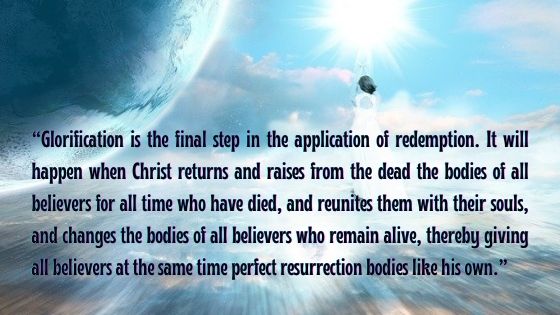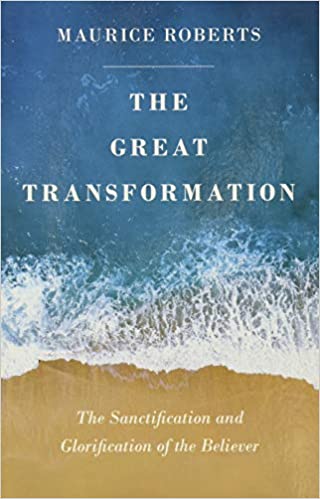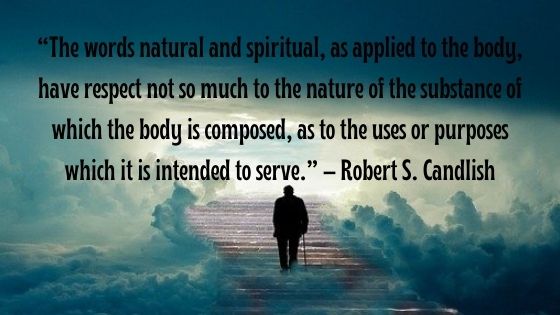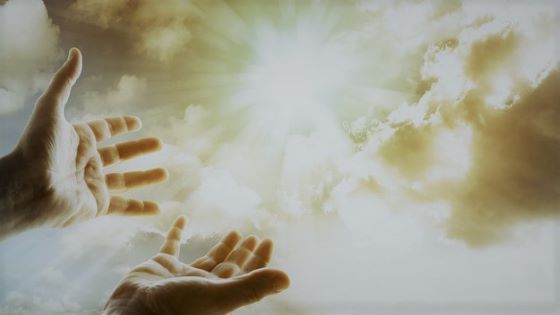Resurrection Sunday is a day that Christians all around the world celebrate. Why? That’s because Jesus’ resurrection guarantees believers that they too will be resurrected. (See 1 Thessalonians 4:16; 1 Corinthians 15:12, 20, 52; Acts 24:16).
This doctrine is known as the glorification of the believers (Romans 8:30). When Christ redeemed us, He did not just redeem our spirits (or souls)—he redeemed us as whole persons, and this includes the redemption of our bodies.
Therefore, the application of Christ’s work of redemption to us will not be complete until our bodies are entirely set free from the effects of the fall and brought to that state of perfection for which God created them.
However, the redemption of our bodies will only occur when Christ returns and raises our bodies from the dead. Paul says we eagerly wait for the redemption of our bodies (Romans 8:23).

Redemption of the Believer
The primary New Testament passage on glorification or the resurrection of the body is 1 Corinthians 15:22–23.
Paul discusses the nature of the resurrection body in some detail in 1 Corinthians 15:35-50. He then concludes by saying that not all Christians will die. Rather, some will remain alive when Christ returns and will have their bodies instantaneously changed into new, resurrection bodies. These bodies can never grow old or weak and can never die (1 Corinthians 15:51-52).
Paul further explains in 1 Thessalonians 4:14-17 that the souls of those who have died and gone to be with Christ will come back and be joined with their bodies on that day, for Christ will bring them with him.
Several other New Testament passages that affirm the reality of the doctrine of glorification include John 5:28-29; John 6:39-40, 44, 54; Romans 8:11, and 2 Corinthians 5:1-10.
Resurrection in the Old Testament
Is there any evidence of hope in a future resurrection of the body in the Old Testament? Yes!
First, even before Jesus was raised from the dead, the New Testament indicates that many Jewish people living at the time of Christ had some hope of a future bodily resurrection (John 11:23-24; Acts 24:15).
Hebrews 11:10 tells us that “Abraham waited for the city which has foundations, whose builder and maker is God.” We also read that many Old Testament saints “died in faith, not having received the promises, but having seen them afar off were assured of them …” (Hebrews 11:13–16).
The author even says that Abraham “concluded that God was able to raise him up, even from the dead” (Hebrews 11:19).
When we look at the actual teachings of the Old Testament itself, there are indications that Old Testament authors had a strong expectation of the resurrection to come in the future. See Job 19:25-26; Psalm 49:15; 73:24-25; Proverbs 23:13-14; Isaiah 26:19; Daniel 12:2.
The Believer’s Resurrection Body
If Christ will raise our bodies from the dead when He returns, and if our bodies will be like His resurrection body (1 Corinthians 15:20, 23, 49; Philippians 3:21), then what will our resurrection bodies be like?
Imperishable
The fact that our new bodies will be “imperishable” means that they will not wear out or grow old or ever be subject to any kind of sickness or disease. They will be completely healthy and strong forever.
Moreover, since the gradual process of aging is part of the process by which our bodies now are subject to “corruption,” it is appropriate to think that our resurrection bodies will have no sign of aging, but will have the characteristics of youthful but mature manhood or womanhood forever.
There will be no evidence of disease or injury, for all will be made perfect. Our resurrection bodies will show the fulfillment of God’s perfect wisdom in creating us as human beings who are the pinnacle of His creation and the appropriate bearers of His likeness and image.
In these resurrection bodies, we will see humanity as God intended it to be.
Raised in Glory
Paul also says our bodies will be raised “in glory.”
 When this term is contrasted with “dishonor,” as it is here, there is a suggestion of the beauty or the attractiveness of appearance that our bodies will have. They will no longer be “dishonorable” or unattractive but will look “glorious” in their beauty.
When this term is contrasted with “dishonor,” as it is here, there is a suggestion of the beauty or the attractiveness of appearance that our bodies will have. They will no longer be “dishonorable” or unattractive but will look “glorious” in their beauty.
Moreover, because the word “glory” is so frequently used in Scripture of the bright shining radiance that surrounds the presence of God Himself, this term suggests that there will also be a kind of brightness or radiance surrounding our bodies.
That will be appropriate outward evidence of the position of exaltation and rule over all creation that God has given to us (Matthew 13:43; Daniel 12:3).
Some suggest that these statements might be understood metaphorically. But the hints of the age to come were seen in the shining of the glory of God from the face of Moses (Exodus 34:35).
And in a much greater way, the bright light that shone from Jesus at the transfiguration (Matthew 17:2), together with the fact that we will bear the image of Christ and be like Him (1 Corinthians 15:49), combine to suggest that there will be a visible brightness or radiance that surrounds us when we are in our resurrection bodies.
Raised in Power
Our bodies will also be raised “in power” (1 Corinthians 15:43), which is in contrast to the “weakness” which we see in our bodies now.
Our resurrection bodies will not only be free from disease and aging but they will also be given the fullness of strength and power. Here on earth, we find that the spirit sometimes is willing but the body is weak. Some devout believers cannot as much attend worship services because of bodily affliction. But in heaven, we will all have strong bodies.
We will have complete human power and strength – the strength that God intended human beings to have in their bodies when He created them. It will therefore be a strength that is sufficient to do all that we desire to do in conformity with the will of God.
Spiritual Body
Finally, Paul says that the body is raised as a “spiritual body” (1 Corinthians 15:44).
We must make clear that the phrase “a spiritual body” does not so much as infer that the resurrection body will be composed of intangible substance.
Rather, it means that while on earth, we are occupied to a greater degree with the natural body. Our bodies are engaged chiefly with the activities and the environment of earth.
In our resurrection bodies, we will be occupied with all that pertains to God and godliness. In other words, the spiritual life of man prevails.

Paul said, “Although I want to do good, evil is right there with me” (Romans 7:21, NIV). There was no question that he was truly God’s child by the transforming power of the Spirit. But the natural man was still very much alive in him.
Christians are hindered by the attitude of the natural toward the spiritual. In our resurrected bodies, the higher principles in us will predominate and the full tide of spiritual life will be in control.
The point is that we follow Jesus in His resurrection by sharing the same kind of body that he has, namely, a spiritual and heavenly one.
Conclusion
When Christ returns, He will give us new resurrection bodies to be like His resurrection body (1 John 3:2).
Although the emphasis of Scripture is on the fact that believers will experience a bodily resurrection, some passages state that unbelievers will also be raised from the dead, but that they will face the final judgment at the time they are raised.
Jesus clearly teaches that “those who have done evil” will come forth “to the resurrection of judgment” (John 5:29). Paul also said that he believed “that there will be a resurrection of both the just and the unjust” (Acts 24:15; Matt. 25:31–46; Daniel 12:2).
Disclaimer: As an Amazon Associate, I may earn a commission when you use any links on this page to make a purchase, but at no additional cost to you.
Reference: Systematic Theology by Wayne Grudem

